Rodrigo Nogueira
Curió-Edu 7B: Examining Data Selection Impacts in LLM Continued Pretraining
Dec 14, 2025Abstract:Continued pretraining extends a language model's capabilities by further exposing it to additional data, often tailored to a specific linguistic or domain context. This strategy has emerged as an efficient alternative to full retraining when adapting general-purpose models to new settings. In this work, we investigate this paradigm through Curió 7B, a 7-billion-parameter model derived from LLaMA-2 and trained on 100 billion Portuguese tokens from the ClassiCC-PT corpus - the most extensive Portuguese-specific continued-pretraining effort above the three-billion-parameter scale to date. Beyond scale, we investigate whether quantity alone suffices or whether data quality plays a decisive role in linguistic adaptation. To this end, we introduce Curió-Edu 7B, a variant trained exclusively on the educational and STEM-filtered subset of the same corpus, totaling just 10 billion tokens. Despite using only 10% of the data and 20% of the computation, Curió-Edu 7B surpasses the full-corpus model in our evaluations, demonstrating that data selection can be fundamental even when adapting models with limited prior exposure to the target language. The developed models are available at https://huggingface.co/collections/ClassiCC-Corpus/curio-edu
Building High-Quality Datasets for Portuguese LLMs: From Common Crawl Snapshots to Industrial-Grade Corpora
Sep 10, 2025Abstract:The performance of large language models (LLMs) is deeply influenced by the quality and composition of their training data. While much of the existing work has centered on English, there remains a gap in understanding how to construct effective training corpora for other languages. We explore scalable methods for building web-based corpora for LLMs. We apply them to build a new 120B token corpus in Portuguese that achieves competitive results to an industrial-grade corpus. Using a continual pretraining setup, we study how different data selection and preprocessing strategies affect LLM performance when transitioning a model originally trained in English to another language. Our findings demonstrate the value of language-specific filtering pipelines, including classifiers for education, science, technology, engineering, and mathematics (STEM), as well as toxic content. We show that adapting a model to the target language leads to performance improvements, reinforcing the importance of high-quality, language-specific data. While our case study focuses on Portuguese, our methods are applicable to other languages, offering insights for multilingual LLM development.
Comparing Knowledge Injection Methods for LLMs in a Low-Resource Regime
Aug 08, 2025Abstract:Large language models (LLMs) often require vast amounts of text to effectively acquire new knowledge. While continuing pre-training on large corpora or employing retrieval-augmented generation (RAG) has proven successful, updating an LLM with only a few thousand or million tokens remains challenging. In this work, we investigate the task of injecting small, unstructured information into LLMs and its relation to the catastrophic forgetting phenomenon. We use a dataset of recent news -- ensuring no overlap with the model's pre-training data -- to evaluate the knowledge acquisition by probing the model with question-answer pairs related the learned information. Starting from a continued pre-training baseline, we explored different augmentation algorithms to generate synthetic data to improve the knowledge acquisition capabilities. Our experiments show that simply continuing pre-training on limited data yields modest improvements, whereas exposing the model to diverse textual variations significantly improves the learning of new facts -- particularly with methods that induce greater variability through diverse prompting. Furthermore, we shed light on the forgetting phenomenon in small-data regimes, illustrating the delicate balance between learning new content and retaining existing capabilities. We also confirm the sensitivity of RAG-based approaches for knowledge injection, which often lead to greater degradation on control datasets compared to parametric methods. Finally, we demonstrate that models can generate effective synthetic training data themselves, suggesting a pathway toward self-improving model updates. All code and generated data used in our experiments are publicly available, providing a resource for studying efficient knowledge injection in LLMs with limited data at https://github.com/hugoabonizio/knowledge-injection-methods.
Automatic Legal Writing Evaluation of LLMs
Apr 29, 2025Abstract:Despite the recent advances in Large Language Models, benchmarks for evaluating legal writing remain scarce due to the inherent complexity of assessing open-ended responses in this domain. One of the key challenges in evaluating language models on domain-specific tasks is finding test datasets that are public, frequently updated, and contain comprehensive evaluation guidelines. The Brazilian Bar Examination meets these requirements. We introduce oab-bench, a benchmark comprising 105 questions across seven areas of law from recent editions of the exam. The benchmark includes comprehensive evaluation guidelines and reference materials used by human examiners to ensure consistent grading. We evaluate the performance of four LLMs on oab-bench, finding that Claude-3.5 Sonnet achieves the best results with an average score of 7.93 out of 10, passing all 21 exams. We also investigated whether LLMs can serve as reliable automated judges for evaluating legal writing. Our experiments show that frontier models like OpenAI's o1 achieve a strong correlation with human scores when evaluating approved exams, suggesting their potential as reliable automated evaluators despite the inherently subjective nature of legal writing assessment. The source code and the benchmark -- containing questions, evaluation guidelines, model-generated responses, and their respective automated evaluations -- are publicly available.
TiEBe: A Benchmark for Assessing the Current Knowledge of Large Language Models
Jan 13, 2025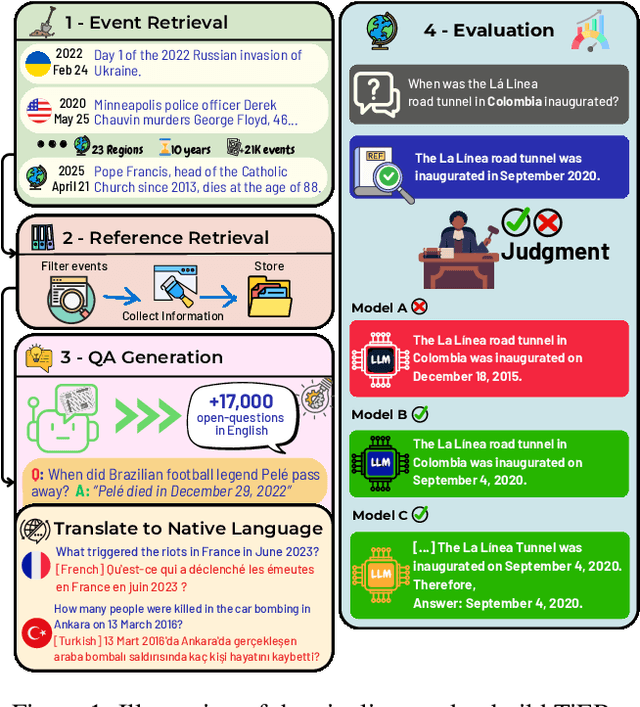
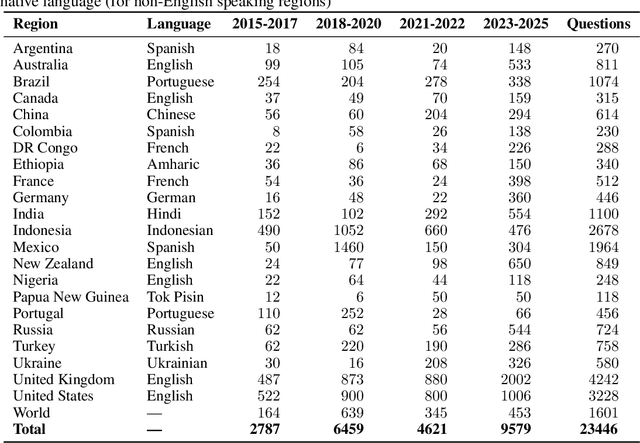
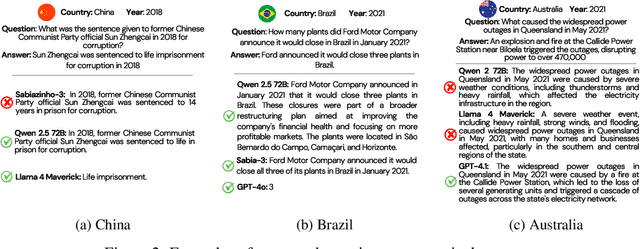
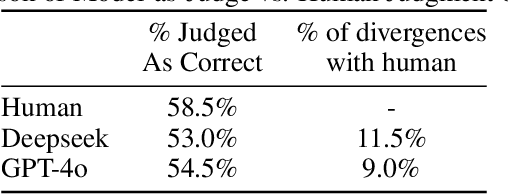
Abstract:In a rapidly evolving knowledge landscape and the increasing adoption of large language models, a need has emerged to keep these models continuously updated with current events. While existing benchmarks evaluate general factual recall, they often overlook two critical aspects: the ability of models to integrate evolving knowledge through continual learning and the significant regional disparities in their performance. To address these gaps, we introduce the Timely Events Benchmark (TiEBe), a dataset containing over 11,000 question-answer pairs focused on globally and regionally significant events. TiEBe leverages structured retrospective data from Wikipedia, enabling continuous updates to assess LLMs' knowledge of evolving global affairs and their understanding of events across different regions. Our benchmark demonstrates that LLMs exhibit substantial geographic disparities in factual recall, emphasizing the need for more balanced global knowledge representation. Furthermore, TiEBe serves as a tool for evaluating continual learning strategies, providing insights into models' ability to acquire new information without forgetting past knowledge.
The interplay between domain specialization and model size: a case study in the legal domain
Jan 03, 2025Abstract:Scaling laws for language models so far focused on finding the compute-optimal model size and token count for training from scratch. However, achieving this optimal balance requires significant compute resources due to the extensive data demands when training models from randomly-initialized weights. Continual pre-training offers a cost-effective alternative, leveraging the compute investment from pre-trained models to incorporate new knowledge without requiring extensive new data. Recent findings suggest that data quality influences constants in scaling laws, thereby altering the optimal parameter-token allocation ratio. Building on this insight, we investigate the interplay between domain specialization and model size during continual pre-training under compute-constrained scenarios. Our goal is to identify a compute-efficient training regime for this scenario and, potentially, detect patterns in this interplay that can be generalized across different model sizes and domains. To compare general and specialized training, we filtered a web-based dataset to extract legal domain data. We pre-trained models with 1.5B, 3B, 7B and 14B parameters on both the unfiltered and filtered datasets, then evaluated their performance on legal exams. Results show that as model size increases, the compute-effectiveness gap between specialized and general models widens.
Sabiá-3 Technical Report
Oct 15, 2024Abstract:This report presents Sabi\'a-3, our new flagship language model trained on a large brazilian-centric corpus. Evaluations across diverse professional and academic benchmarks show a strong performance on Portuguese and Brazil-related tasks. Sabi\'a-3 shows large improvements in comparison to our previous best of model, Sabi\'a-2 Medium, especially in reasoning-intensive tasks. Notably, Sabi\'a-3's average performance matches frontier LLMs, while it is offered at a three to four times lower cost per token, reinforcing the benefits of domain specialization.
MLissard: Multilingual Long and Simple Sequential Reasoning Benchmarks
Oct 08, 2024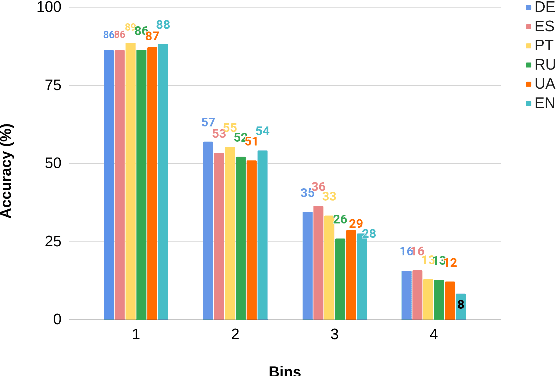

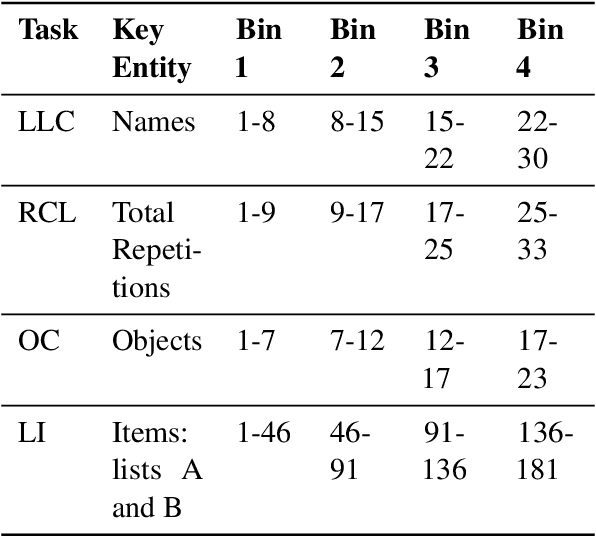
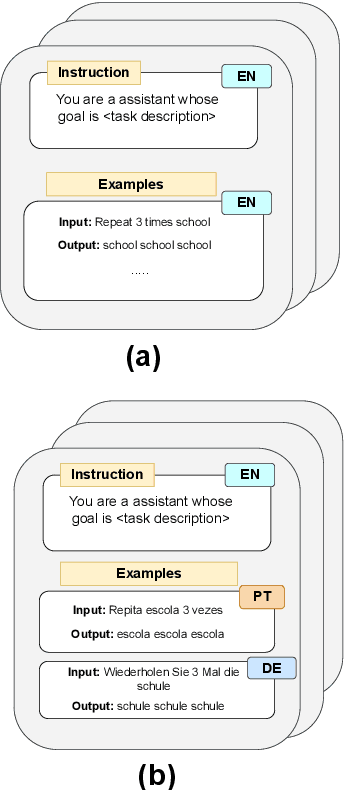
Abstract:Language models are now capable of solving tasks that require dealing with long sequences consisting of hundreds of thousands of tokens. However, they often fail on tasks that require repetitive use of simple rules, even on sequences that are much shorter than those seen during training. For example, state-of-the-art LLMs can find common items in two lists with up to 20 items but fail when lists have 80 items. In this paper, we introduce MLissard, a multilingual benchmark designed to evaluate models' abilities to process and generate texts of varied lengths and offers a mechanism for controlling sequence complexity. Our evaluation of open-source and proprietary models show a consistent decline in performance across all models and languages as the complexity of the sequence increases. Surprisingly, the use of in-context examples in languages other than English helps increase extrapolation performance significantly. The datasets and code are available at https://github.com/unicamp-dl/Lissard
SurveySum: A Dataset for Summarizing Multiple Scientific Articles into a Survey Section
Aug 29, 2024



Abstract:Document summarization is a task to shorten texts into concise and informative summaries. This paper introduces a novel dataset designed for summarizing multiple scientific articles into a section of a survey. Our contributions are: (1) SurveySum, a new dataset addressing the gap in domain-specific summarization tools; (2) two specific pipelines to summarize scientific articles into a section of a survey; and (3) the evaluation of these pipelines using multiple metrics to compare their performance. Our results highlight the importance of high-quality retrieval stages and the impact of different configurations on the quality of generated summaries.
ptt5-v2: A Closer Look at Continued Pretraining of T5 Models for the Portuguese Language
Jun 16, 2024Abstract:Despite advancements in Natural Language Processing (NLP) and the growing availability of pretrained models, the English language remains the primary focus of model development. Continued pretraining on language-specific corpora provides a practical solution for adapting models to other languages. However, the impact of different pretraining settings on downstream tasks remains underexplored. This work introduces $\texttt{ptt5-v2}$, investigating the continued pretraining of T5 models for Portuguese. We first develop a baseline set of settings and pretrain models with sizes up to 3B parameters. Finetuning on three Portuguese downstream tasks (assin2 STS, assin2 RTE, and TweetSentBR) yields SOTA results on the latter two. We then explore the effects of different pretraining configurations, including quality filters, optimization strategies, and multi-epoch pretraining. Perhaps surprisingly, their impact remains subtle compared to our baseline. We release $\texttt{ptt5-v2}$ pretrained checkpoints and the finetuned MonoT5 rerankers on HuggingFace at https://huggingface.co/collections/unicamp-dl/ptt5-v2-666538a650188ba00aa8d2d0 and https://huggingface.co/collections/unicamp-dl/monoptt5-66653981877df3ea727f720d.
 Add to Chrome
Add to Chrome Add to Firefox
Add to Firefox Add to Edge
Add to Edge